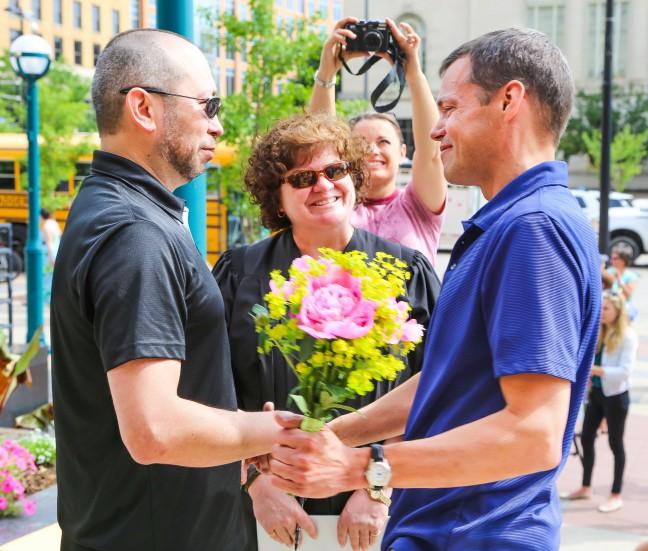A federal appeals court panel unanimously ruled Wisconsin and Indiana’s bans on same sex marriage unconstitutional, saying the “discrimination against same-sex couples is irrational.”
The ruling comes nearly two months after a federal district court judge struck down the ban on same-sex marriage in Wisconsin, a decision that Attorney General J.B. Van Hollen appealed. Wisconsin’s appeal was consolidated with a similar case in Indiana.
The three-judge appeals court panel — which appeared skeptical of the state’s arguments for the ban at oral arguments late last month — ruled unanimously that the states’ same-sex marriage bans deny same-sex couples “equal protection under the law.”
“Our pair of cases is rich in detail but ultimately straightforward to decide,” Judge Richard Posner wrote for the three-judge panel. “The challenged laws discriminate against a minority defined by an immutable characteristic, and the only rationale that the states put forth with any conviction — that same-sex couples and their children don’t need marriage because same-sex couples can’t produce children, intended or unintended — is so full of holes that it cannot be taken seriously.”
Dana Brueck, a spokesperson for the Wisconsin’s Department of Justice, said Van Hollen will appeal the ruling.
She also said the stay on the district court ruling overturning the ban, which is currently effectively preventing any same-sex marriages from happening, is still in place.
“The Attorney General has always believed that this case will ultimately be decided by the United States Supreme Court,” Brueck said in an e-mail. “The stay remains in effect until all appeals have been concluded.”
Dane County Clerk Scott McDonnell said in a statement his office “cannot legally issue any more same-sex marriage licenses” until the appeals court issues a mandate a few weeks from now, which would make it clear whether the stay is still in effect.
U.S. Rep. Mark Pocan, D-Madison, who is gay, urged Gov. Scott Walker and Van Hollen to stop any plans to appeal the ruling, saying the ban classified same-sex couples as “second class citizens.”
“In ruling after ruling, it has become unmistakable that the promise of America is everyone should be treated equally and with dignity,” Pocan said. “Today’s ruling brings us one step closer to fulfilling that promise.”
U.S. Sen. Tammy Baldwin, the first openly gay senator, said the decision was “an affirmation” that Wisconsin treats every citizen equally.
However, Julaine Appling, president of Wisconsin Family Action, criticized the ruling in a statement, although she said she already “knew what the outcome was going to be.”
“We are deeply disappointed but not surprised at this ruling,” Appling said. “We knew we had the most liberal panel of judges on the 7th Circuit. When they denied the state’s request to have the case heard before all ten judges on the court, we pretty much knew what to expect.”
Appling pointed to a ruling in Louisiana yesterday where a federal judge upheld the state’s gay marriage ban.
She called the judge someone “with courage, common sense and an understanding of the law.”
“The struggle to preserve and protect traditional marriage is far from over,” Appling said. “This ruling does not change the fact that a marriage of one man and one woman is the healthiest, most prosperous, and most stable place not only for the man and woman but also for the children they may bring into the world.”
In Madison, however, the American Civil Liberties Union held a news conference at the Plan B dance club with some of the couples who sued against the ban.
Judi Trampf and Katy Heyning said they were “thrilled” with the ruling and said that Wisconsin has taken a giant leap forward in marriage equality. The occasion was particularly special for the couple since today’s ruling falls on Trampf’s birthday, she said, adding she “couldn’t have asked for anything better.”
Salud Garcia and Pam Kleiss said the ban particularly affected them as parents.
“The fight was about love and we have to show the courts [how] our families are impacted,” Garcia said. “Our children cannot be treated as second class citizens because of who their parents are.”
This post has been updated with further reaction to the ruling.


